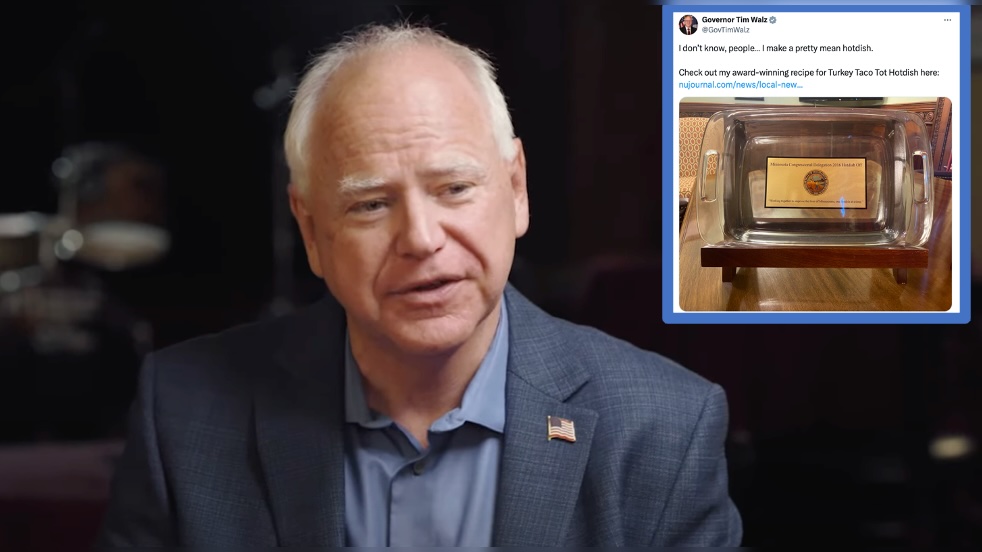Unpacking the Taco Controversy: Tim Walz’s Culinary Claims Under Fire
What’s Cooking with Governor Walz?
In a surprising twist that has left many scratching their heads, Democratic Vice Presidential candidate and Minnesota Governor Tim Walz recently claimed he makes “white guy tacos” using no seasoning other than pepper. In a video featuring him and Kamala Harris, this assertion quickly sparked debate and backlash. Why? Because it plays into an old stereotype—that white people simply don’t season their food.
But hold on a second! Is this claim really accurate? A quick dive into Walz’s culinary history reveals something quite different.
A Taste of Irony: The Truth Behind the Tacos
Back in 2016, Walz snagged the top prize at U.S. Sen. Al Franken’s sixth annual hotdish competition—a beloved Minnesota tradition where congressional members whip up their best dishes. His winning creation? A Turkey Taco Tot Hotdish, which boasted an array of spices including paprika, chili powder, onion powder, and garlic powder. So much for bland tacos!
According to a report from the NU Journal, Walz’s flavorful dish not only won accolades but also showcased his prowess in the kitchen—definitely not your typical “white guy taco” fare!
Walz’s Winning Streak in Hotdish Competitions
It seems that cooking is more than just a hobby for Governor Walz. He has dominated these hotdish competitions over the years, taking home first place multiple times—three out of four years to be exact! In 2014, his Turkey Trot Tater-Tot Hotdish clinched victory, while in 2013 he wowed judges with his Hermann the German Hotdish.
What’s even more interesting is that these contests aren’t just about bragging rights; they are meant to unite Minnesota’s delegation through friendly culinary competition. The judging panel included prominent figures like award-winning food critic Tom Sietsema from The Washington Post who went incognito just to maintain anonymity during restaurant visits. If anyone knows good food when they taste it, it’s definitely him!
The Backlash: Social Media Reactions and Cultural Sensitivity
With Walz’s comments swirling around social media platforms like wildfire, reactions have ranged from disbelief to outright laughter. Many are questioning how someone could win such prestigious cooking competitions while simultaneously claiming to lack seasoning skills.
The conversation surrounding cultural stereotypes also resurfaced with vigor. Critics argue that perpetuating such ideas can reinforce harmful narratives about racial or ethnic groups’ culinary practices. After all, food is an essential part of culture—and it deserves respect regardless of who prepares it!
Here’s what some folks had to say on Twitter:
The online discourse has certainly drawn attention beyond mere political banter; it reflects deeper issues about identity and representation in American cuisine.
Cooking Up Credibility: What Does This Mean for Walz?
So what does all this mean for Governor Walz as he campaigns alongside Kamala Harris? Well, credibility is key in politics—especially when you’re running for office at such high levels. Voters want authenticity from their leaders; they crave transparency and honesty—even when discussing something as seemingly innocuous as tacos.
If voters begin to view him as someone who might exaggerate or misrepresent simple facts (like taco recipes), his image could take a hit. Trust once lost can be challenging to regain!
Additionally, will this controversy affect how people perceive cultural discussions moving forward? With conversations about race and cuisine becoming increasingly common across America, candidates must tread carefully—or risk getting burned by their own words.
Final Thoughts
As we delve into this taco tale filled with spice—or lack thereof—it serves as a reminder that our words matter greatly in public discourse. Whether we’re talking politics or dinner recipes, truthfulness should always reign supreme.
Now we turn it over to you! What do you think about Tim Walz’s claims regarding his taco-making skills? Do you believe cultural stereotypes play too large a role in our society today? Share your thoughts below!


Leave a Comment